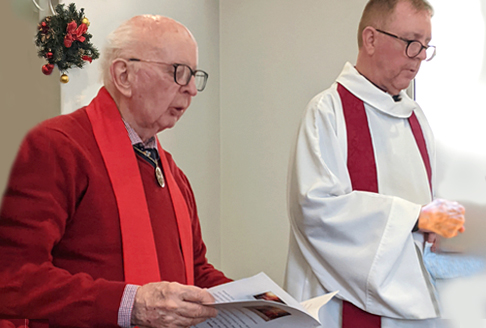It’s Sunday morning at Baptcare Karana community. Time for the church service has been a weekly event for residents since Karana opened in 1959.
As you approach the chapel, Marge greets you. She is 91 and struggles with her eyesight but she never misses an attendee, welcoming each person and giving them an Order of Service.
The Bible reading is usually given by Brenda or Grace. They are former schoolteachers and both have superb diction. They also have Alzheimer’s disease.
Millie is 96, and she needed Karana Chaplain Sam Lo’s support to read the Lesson, but she was proud to take a turn. “All of the residents thought it was brilliant to see Millie having a go,” Sam says. “Her family couldn’t believe it when she said she did the Bible reading, but I told them it was true.”
The hymns are sung enthusiastically, a reminder of the pleasure of revisiting well-loved lyrics and tunes. Sam sometimes recruits a resident with a strong, true voice to help her lead the singing. Family members often come in and play the piano for the service, but occasionally residents do the honours instead.
As the service concludes, retired Anglican priest Brian gives the blessing. His dementia is quite advanced, but every Sunday his vocation is evident as he provides a meaningful and moving blessing to send the worshippers on their way for another week.
While the Sunday service has always been integral to life at Karana, for decades it was delivered by visiting clergy on a roster basis. Then COVID-19 hit, outsiders could not come into the home, and Sam took on the role of leading the service every week.
“The advantage is, I know the residents and the residents know me,” Sam says. “We went from a congregation of about 20 to now having 45 on the chapel list. A lot of people who had disconnected from church are coming back into the services because they feel comfortable and safe to explore faith again.
“My ethos around dementia is that there is a lot of loss, a lot we can’t do – but there is so much we can do, and we need to hang on to every bit of it... Yes, the grief of dementia can be horrendous, but there are pockets of grace along the way.”
A resident at Baptcare Karana
Caring for the whole individual – the spiritual needs as well as material – is a key part of the Baptcare difference. Baptcare believes that every person should be cherished, and that fullness of life is the aim regardless of age, culture, belief or circumstances.
Sam’s background is in hospital chaplaincy and teaching, and this shows through the thoughtful way she structures Sunday morning, seeking a role for everyone who wants to take part. She produces the Order of Service in large print, and every page has a photo on it. “Facility with numbers is one of the first things to disappear for people with dementia,” she explains. “People in our congregation might not be able to find ‘page three’, but they can find the page with yellow roses or laughing children.”
In many mainstream churches morning tea is an important part of fellowship, traditionally taking place after the service, but Sam was alert to the situation of people with blood sugar stability issues or who are absorbing medication. Consequently she flipped the routine, and serves morning tea prior to the service. Residents help prepare and distribute the food and drink.
“My faith feels like everything to me now’. And she’s there every Sunday.”
A resident at Baptcare Karana
“We have one resident who is 96, very frail and has dementia, but each Sunday I put the plate of cakes on her walker and she takes them around to people. After the service I have two other ladies with Alzheimer’s who do the washing and drying of all the dishes. They sing together the whole time they do it. It lifts their spirits: they feel useful, they work together, and they are genuinely assisting in ways that have been part of their lives for decades.
“One Thursday a month we have communion. It says everything about the culture of Karana that the RCSM (Residential Care & Services Manager) drops whatever he is doing and together, Adam and I bring the sacraments to the residents. That underlines the importance that is given to spiritual care in our home.
“My philosophy is that it is not a matter of doing to and for our residents, but allowing them to own the space. Something I have noticed, that is really encouraging, is the spiritual growth. So often with this generation, they grew up with the notion of an angry God. They felt they had to be good, behave yourself, not do this or that in order to be acceptable to God, and a lot of that fear is very evident.
“Now with the people at Karana, we are learning about God as someone who loves us. I was talking to one woman recently who spent her whole life thinking God was angry with her, and now she has found out that her God is someone who loves her.
*Some residents’ names have been changed for reasons of privacy
Community news
-

Faces of Baptcare: Stephanie Gonsalves
I am Operations Manager, Community Services Victoria. This involves providing support to a range of different programs to support our community. That might be sharing tips and tricks to solve problems, connecting great minds to collaborate on ideas, ensuring we are delivering quality services to the people we serve and celebrating the wins!
- 02 May 2025
-

Back to School Tips for Foster and Kinship Carers
Heading back to school can be exciting, but it can also bring up big feelings—especially for kids in care. Here are a few simple ways to help make the transition smoother.
- 17 Apr 2025
-

Easter Reflection from Emily Booth of our Spiritual Care Team
A few years ago, at Easter, I was staying with my sister and her family for the weekend. One afternoon we were all sitting around chatting and the kids were playing when my sister came into the room and placed a tray of fresh, warm hot cross buns on the table
- 16 Apr 2025

